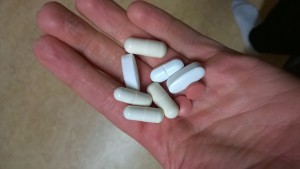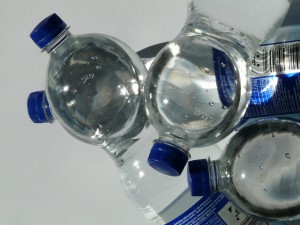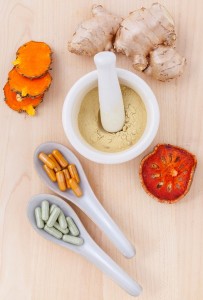Should you take vitamin / mineral supplements? Do we really need to supplement our diets? Can’t we get all our necessary nutrition from food?
Is your head spinning with information about the pros and cons of taking vitamin / mineral supplements? If so, you are certainly not alone. We are inundated with information and junk science at every turn of the road these days about which vitamins to take, as well as what kind of vitamin supplements to take. All of this noisy, conflicting information is enough to drive one to junk food! Many people have started supplement regimens only to be discouraged after a time when they hear something negative in the media, or even perhaps learn something unsavory about what they’ve been taking. For instance, a friend was talking excitedly about a new supplement she was taking the other day only to learn that its gel capsule was made of a questionable type of quasi bottom-feeding fish which is often farm-raised under dubious circumstances. We’ll save that for another blog post.
Meanwhile, in your quest for knowledge about the pros and cons of taking dietary supplements, please consider the following 7 reasons you should think about vitamin supplementation:
1. The Standard American Diet Does Not Contain the Necessary Nutrients for Optimal Health

Are you stressed out? Are you eating on the fly and stuffing the first thing you find into your mouth just to keep going? Are you relying on coffee, other caffeinated drinks or sugary treats to keep your energy level up? If so, you are most likely not getting the necessary nutrients in your diet to remain healthy. Our American lifestyle simply does not lend itself to healthy eating.
B Vitamins
Let’s take B Vitamins, for instance: B Vitamins are absolutely crucial to good health. Some of the food sources of B vitamins are: beans, beef, poultry, fish, eggs, dairy, whole grains, various vegetables and fruits, and dark leafy greens. But be honest with yourself: are you eating a combination of these foods on an ongoing basis? Bear in mind, there are many B Vitamins: B1, B2, B3, B5, B6, B7, B9, and B12 (in other words: B Complex) all found in varying amounts in different foods/food groups. Because there are so many necessary B vitamins, you need to be eating a balanced diet at all times to even come close to getting the necessary amount of B Complex. If you’re merely eating “whatever whenever” as many busy Americans do, or are living on fast food or packaged food, you may not be getting the nutrients you need. Also, if you have food allergies and can’t eat from some of the food groups listed above, or are vegan or vegetarian, there is a good chance you’re not getting your daily necessary amount of B vitamins. There are very few people in the United States who get the necessary amount of B vitamins from food alone.1
Omega 3 Fatty Acids
Another crucial thing for your health: Omega 3 Fatty Acids (found in fish oils and some plant oils). In the standard American diet, rather than consuming a good amount of the extremely essential omega 3 fatty acids, most Americans instead consume a great deal more Omega 6 fatty acids2 (present in corn, soybean and sunflower oils); this imbalance can leave you unprotected from various types of serious diseases, including heart disease. Are you eating fish at least several times a week? If not, there is a good chance you’re not getting anywhere near enough omega 3 fatty acids. On top of that: sadly, because of pollution, most fish now contains a high level of mercury and it is really no longer even advisable to eat several servings of fish per week! The beauty of fish oil supplements is that they can be molecularly distilled to remove contaminants, AND third-party tested to be sure they are free of PCBs3 and mercury (although most vitamin / mineral supplements, such as the ones found at major retailers, are not).
The list of necessary nutrients we do not get from our diet is a long one! According to the NHANES data from the US government studying the dietary habits of Americans, few of us get enough magnesium or zinc to meet minimum standards, let alone to help if we become dehydrated or need enough zinc to aid wound healing.
Vitamin deficiencies are risk factors for chronic diseases such as cancer, heart disease and osteoporosis. Sadly, many health care professionals are unaware of common food sources of vitamins. “Most people do not consume an optimal amount of all vitamins by diet alone…it appears prudent for all adults to take vitamin supplements.”4
2. Mass Food Production Has Led to Nutrient Depletion in Our Foods

Are we getting the same vitamins and minerals from our fruits and vegetables as people did decades ago? Common sense says that you can’t have nutrient-filled food without having nutrient-filled soil. Good, healthy soil management is essential in order to keep peak nutritional flow from the soil, to the crop, and then into our bodies. Crop rotation and crop sequencing is important to the maintenance and health of organic soil nutrients.5 However, during mass food production, the old practices of crop rotation, sequencing, and letting land lie fallow for periods of time with cover crops, have fallen by the wayside in favor of new methods of blasting potential soil disease problems with chemicals, etc.
Also, changes in cultivated varieties have led to a decline in the nutrient level of many fruits and vegetables.6
Organically grown foods have been shown to have more nutrients than non-organically grown foods, and are specifically shown to be more rich in polyphenols,7 which are important antioxidants. With industrial farming practices, access to local, organically grown food is limited in many parts of the country.
Also, there are naturally derived but toxic pesticides or insecticides which may be used in organic food production in other countries. One such pesticide (a derivative of certain plant roots, which has multiple toxic effects in concentrated form which includes killing fish), is actually used in fisheries to kill off certain types of fish! This certain pesticide is very limited by United States organic farming rules (USDA Organic) and is therefore rarely, if ever, used here; however, as it is not entirely banned by the US, it can be used in industrial organic agricultural practices in other countries and then shipped to us labeled, “organic.”8
3. Certain Widely-Used Over-The-Counter and Prescription Medications Can Deplete Your Body of Vitamins and Minerals

Do you take an over-the-counter medication when you get a headache, or any other type of ache? Do you take OTC medications often? It’s easy to reach for an OTC drug when you’ve overdone the gardening, working out, cleaning the house (a difficult job when done right!), or have indigestion. However, did you know the use of these over-the counter drugs could be depleting your system of much needed vitamins/minerals?
Anti-Inflammatory Medications / NSAIDS
For example, Acetaminophen, one of the most extensively used over-the-counter medications, causes a depletion in glutathione.9,10 Glutathione is the cells’ natural antioxidant; it is present in all the cells of your body and helps fight damage from free radicals. It binds to toxins in the liver to make them more soluble so that they can be easily excreted. “Glutathione acts as an antioxidant, a free radical scavenger and a detoxifying agent.”11
Perhaps you are taking NSAIDS (nonsteroidal anti-inflammatory drugs) for aches and pains? A widely used NSAID is Ibuprofen. NSAIDS can cause deficiencies in the following vitamins/minerals: Iron (iron deficiency can cause tiredness, dizziness, shortness of breath, pale skin and irregular heartbeat); Vitamin B9 also known as Folate (B9/Folate deficiency can cause anemia, birth defects, and make you more susceptible to heart disease and colon cancer), Vitamin C (Vitamin C deficiency can cause wounds to heal more slowly, dry hair, fatigue, anemia and dry and rough skin), and Zinc (zinc deficiency can cause loss of appetite or sense of taste, a weakened immune system, slow growth, skin changes, and being more susceptible to infection).12
A good, high quality multivitamin can protect against some of the deficiencies caused by NSAIDS.
Antacids
Have you ever taken antacids after overdoing the pizza? Many, many Americans make a habit of using over-the-counter antacids for digestive discomfort. In our fast-paced society, it’s no wonder so many people suffer from indigestion.
There are endless commercials on TV about antacids that are basically telling you that you can “eat what you want,” as long as you take their antacid product. What they’re neglecting to tell you is that not only do most antacids contain aluminum, they can cause deficiencies in calcium, copper, iron, magnesium, phosphorus, potassium, Vitamin B12 and zinc.13
We’ll talk more about maintaining a healthy digestive system in future posts.
Prescription Diabetes Medication (Biguanides)
There is a widely prescribed diabetic medication that belongs to a class of drugs called a biguanides. Biguanides “stop the liver from making extra sugar when it’s not needed.”14 Biguanides works well for many people; however, over time, it can cause depletion in Vitamins B9 (folate) and B12.15 Deficiencies in these important B Vitamins have been linked to anemia, birth defects, brain problems, colon cancer and heart disease.16
Please understand: IN NO WAY does this article suggest you stop taking your prescription diabetes medication! It simply asks you to think about supplementing your diet in order to replace these vitamins in which you could possibly be deficient. Please first make sure to discuss any added dietary supplementation with your physician.
Diuretics
Do you have high blood pressure? Does a member of your family have high blood pressure? If so, perhaps you’ve heard of, or take, a “water pill” (diuretic) to control blood pressure. Diuretics are one type of blood pressure medication (widely prescribed). “Diuretics are drugs that can increase the amount of water and sodium that is excreted in the urine.”17 Some common diuretics are Hydrochlorothiazide and Triamterene. Diuretics work very well for many people and help to keep blood pressure at safe levels. However, over time, diuretics can cause depletion of magnesium and potassium.18 Please bear in mind that many times, magnesium is not checked in routine lab tests. Diuretics can also cause deficiencies in calcium and Vitamin B9 (folate).19
Once again, please understand: IN NO WAY does this article suggest you stop taking your prescription blood pressure medication! It simply provides you with information with regard to the possibility of certain vitamin deficiencies it can cause over time.
It is very important, if you are taking any of the prescription medications listed above and wish to supplement your diet, that you first discuss it with your physician.
4. We Are Exposed on a Daily Basis to Toxic Chemicals and Plastics
Chemicals from Pesticides

Life teaches us (eventually, anyway) that the most attractive displays don’t always mean there are nice things on the inside! The most attractive fruit and vegetable displays in the super market can oftentimes be hiding ugly secrets. Harmful pesticides, anti-fungals, and artificial fertilizers have led to an unhealthy merry-go-round of food production. The foods are made (by various means) to “look” good and last as long as possible on the shelf, but with little regard for nutrition and safety.
Plastics and Xenoestrogens

Closely connected to the aforementioned toxins are the ever-present plastics that permeate every aspect of our modern environment. All of these things: pesticides, chemicals and many types of plastics can react in a variety of negative ways with our bodies, even mimicking the effects of the hormone, estrogen. These environmental estrogen-like compounds known as xenoestrogens create different kinds of problems for men and women and can increase the risk of many types of cancer and reproductive problems in both males and females.
What’s a Xenoestrogen?
“Xenoestrogens” are estrogen-like compounds found in many types of plastics and certain pesticides that react negatively with the estrogen receptors in our bodies.
Other harmful stand-out chemicals are Bisphenol-A (known as BPA) and Phthalates (found in the majority of packaging products, and many other plastics: cups, containers, etc.). The Environmental Protection Agency states that “BPA is a reproductive, developmental, and systemic toxicant in animal studies.”20 Phtalaltes are hormone-disrupting chemicals, and since they are not bound chemically to the large array of synthetic products they are in, they are free to cling onto other things and are actually released with each use.21
There are dietary supplements that can assist the body, specifically the liver, in the processing and removal of these toxins; it can also help to normalize the body functions that xenoestrogens, BPA and Phthalates, alter.
5. Our Bodies Are Constantly Being Barraged by Free Radicals
Environmental toxins, industrial pollution, car combustion, factory smoke stacks, many preservatives (e.g., BHT), and even over-exercising can cause something called, Free Radicals:
What is a Free Radical?
A “Free Radical” is a harmful molecule that accelerates the aging process;22 it is an unstable part of an atom formed from toxic exposure to pollution, household chemicals, cigarette smoke, chemicals added to the food and water supply, and from certain bodily processes.
The constant bombardment of free radicals causes damage to the cells that results in inflammation that can cause arthritis, vascular disease, heart disease, stroke, autoimmune diseases and Lupus.
The harmful effects of free radicals can be countered by something called “antioxidant compounds” some of which are found in dark-colored fruits and vegetables, and in concentrated supplement form. Are you eating a lot of dark-colored fruits and vegetables every day to counteract the effects of Free Radicals? Truth be told, most Americans are not doing so. Another superb antioxidant is found in curcumin. Curcumin has been shown to contain antioxidant and anti-inflammatory properties.23
6. What about All the Negative Press Regarding Vitamin / Mineral Supplements?
It just goes to reason that the dietary supplements being tested in large studies are the “market leaders” – the top-selling supplements on the market today. The negative studies published about these supplements are then broadcast over the media. It’s no wonder the studies are negative, considering the harmful ingredients they contain, including: hydrogenated oil, tin, talc, artificial color, and BHT (which is a preservative in a free-radical form). These harmful ingredients are added in order to extend the shelf life of the tablets (similar to that of a Twinkie – which I’m sure you’ve heard has a “forever” shelf life) but unfortunately they act as binders and keep your body from absorbing the actual nutrients within (for which you are actually paying). That’s the reason nurses call these type of vitamin pills, “bed pan bullets.” If you are taking one of the leading national brands of vitamins, please read the ingredient label and see what you are actually ingesting!
Believe it or not, this is the list of ingredients in the top-selling supplement (unfortunately, considered the “industry standard”) on the market today. Because of clever marketing techniques, massive amounts of people are fooled into ingesting these ingredients every day:

As you can see, the negative studies about vitamin supplements are not necessarily reflective of the vitamins themselves, but the harmful preservatives added by these market leaders.
7. Supplement Quality: What Kind of Supplements Should I Take?
Well, I think we’ve learned that the hip, grey-haired couple who look 30-something on the multi-vitamin TV commercial aren’t actually giving you a real education about what’s good for you. Media marketing professionals are trained to make you “trust” the products they advertise. Clever marketing does not necessarily a healthy dietary supplement make!
Look for dietary supplements that are/have been:
- third-party tested (tested by a 3rd party to see if the ingredients are indeed as stated on the label, and are pure)
- free of harmful preservatives and artificial colors
- easily assimilated (bioavailable) into your system (avoid “bed-pan bullet” syndrome!)
- made or formulated in the USA
Read more about Supplement Ingredients here >>>
So…should you take vitamin supplements? Make a sensible decision based upon knowledge and information backed by science. Eating a balanced diet and choosing organic foods where and when possible is an excellent place to begin. However, even with a healthy diet, supplementation may be recommended or even necessary due to modern-day environmental factors, your lifestyle and/or family history.
Please remember, it is highly necessary to discuss any addition of dietary supplementation with your healthcare professional in order that you may avoid harmful interactions with prescription medication or over-the-counter medications/remedies.


